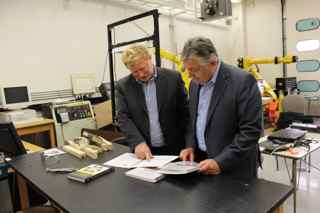
By Stephanie Sokol
The Oakland University School of Engineering and Computer Science is teaming up with business-management firm Fulcrum Edge for a new project management course. Being offered this fall, the class will provide a focus on communication and collaboration in engineering.
 “Because of our location in SE Michigan, a large number of our Masters students— both in our ISE and our Engineering Management programs — work full-time,” said Robert Van Til, Professor and Chair of the ISE Department.
“Because of our location in SE Michigan, a large number of our Masters students— both in our ISE and our Engineering Management programs — work full-time,” said Robert Van Til, Professor and Chair of the ISE Department.
“A lot of what students will learn in this class, they can use immediately in their job, in addition to enhancing their career. This is one of several new application-focused courses the ISE Department is developing in cooperation with a various companies, they really complement our more theoretical courses that are the foundation of an engineering education.”
ISE 595 Special Topics: Engineering Project Management will be taught by ISE Instructor William Edwards, who worked closely with Dean Baker and Mark Lundquist of Fulcrum Edge to design it. The course will apply an “active learning” approach.
Rather than being lecture and textbook-based, group projects will be the focus, with written material as a supplement.
“Students are much more engaged through this process, and it facilitates learning by actually doing it,” Edwards said.
Lundquist, who is on the OU INC business incubator’s advisory board, is working with Baker to pitch this class to universities nationwide, and has other colleges interested in addition to OU. While classes in this subject are common at other universities, the collaboration between education and a business makes OU’s course unique.
“What I’m hoping students see is the transference of education but in a real-world manner,” Lundquist said.
“I’ve lectured at different places, not at the university level but guest speaking, and I know that from my own experience at the University of Illinois, we had a higher, more elevated view of the professors we knew had done work in the non-academic world. So I know most students are hungry for both; they also want the theory and practical background, so they can understand what it will be like when they get out in the workforce. To be able to have a program that can pull all of it together— that’s personally satisfying for me.”
Having worked at Ford and Chrysler, Edwards said communication is an important, sometimes overlooked element of engineering.
Each semester, he takes students on a field trip for real-world experience. This new engineering project management course brings the field trip to the classroom, he said, through the projects as well as Baker and Lundquist’s perspectives.
“I like that (this class) pulls some real-world situations into the classroom,” Edwards said.
“Textbooks give this nice pat-answer, but you want to get the fundamentals so students can be resourceful and react on their own to have a deliverable result. Different groups will bring different perspectives and solutions for the same problem, and I like seeing that— the creativity that you give students.”
Baker authored the course’s textbook, “Multi-Company Project Management,” which he said is divided into three sections.
The first section covers project initiation and planning. The second section covers project execution, control and closure. These represent the five phases of a project. The third section is an application case study that was applied in a real environment.
The application-focused book describes the basic principles of project management, while the two workbooks provide active learning exercises that allow students to experience application of the principles.
The course includes a Lecture Notebook with all class slides to aid students in preparing for class and taking notes. The workbook activities have been proven in the classroom; Baker taught at DeVry University and found that students greatly benefitted from the projects.
“I hope the students are going to come away very excited about the course and what they learned in it— they’ll feel that they actually know how to apply things in the real world,” Baker said.
“Students will have confidence that they can walk in and start performing on a project. I also hope this course makes them very successful as they move on in their careers.”
Edwards, Baker and Lundquist agreed that communication is key between companies. Their shared goal for this course is to help students be a success by offering them practice and guidance, so they can interact in a variety of company situations. Whether it be within the same company, or even on a national level, the new program management course will supply training to help in a variety of situations.
“When I was an undergrad, engineering schools had a very rigorous curriculum,” Edwards said.
“In the real world, those softer sides really played a much greater role than even the technical role. The softer side of working with people from different areas, cultures; the proprietary info that some companies don’t want to give up. We are becoming even more multicultural, dealing with Brazilians, Germans, French, Japanese— some societies are not as open as ours, and are very closed to conversation: ask and only answer the question, not elaborating. But in the end, having a resolution and recovery plan, you can reach a common goal together.”
To learn more about Oakland University's Industrial and Systems Engineering M.S. or its Engineering Management M.S. programs, as well as other programs offered by the ISE Department, visit oakland.edu/secs/ise.